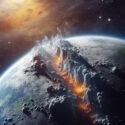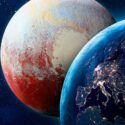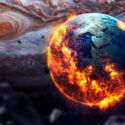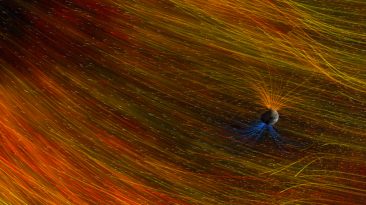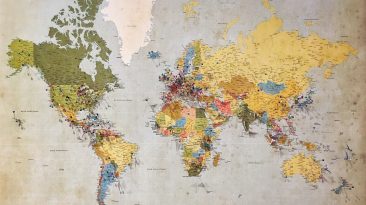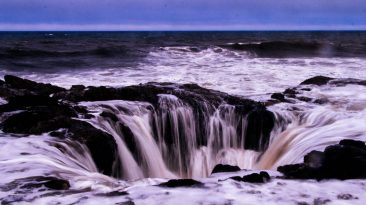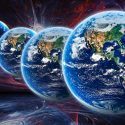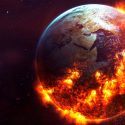I hope you’ve packed some ice skates for your next trip out to sea because the oceans have completely frozen over. What conditions could cause this massive oceanic freeze?
How would this impact other parts of the planet? And how could this lead to the mass extinction of life on Earth?
Earth has gone through at least five major ice ages. The last peaked about 20,000 years ago and made the Earth about 5 °C (10 °F) colder than today.
But even then, you wouldn’t have seen a complete surface freeze of all the Earth’s oceans. In this scenario, that’s our starting point.
A few key factors keep our oceans in a liquid state except for the coldest parts of the Arctic and Antarctic regions. If these factors were suddenly removed, there would be ice. And lots of it.
The first factor is the high concentration of salt. It lowers the freezing point of the water from 0° C (32 °F) to -2 °C (28 °F).
Another reason is that there is so, so, so much of it. About 71% of the Earth’s surface is water-covered, and about 96.5% of that is saltwater.
All that volume means an enormous amount of heat would need to be removed to reach freezing temperatures. Don’t forget the oceans are constantly in motion too. Currents distribute warmer waters to colder regions.
Lastly, the Earth’s crust is thinnest under the ocean’s. A lot of geothermal heat escapes from the mantle and into the water. Without those, I hope you’ve got sunglasses because the Earth would be a cold but reflective planet..
This is because ice and snow have what is known as a high albedo. That’s the term for how reflective a surface is. This effect explains how the polar ice caps have helped keep Earth’s climate stabilized for millennia.
Once more than half of the Earth is covered in ice, it would reflect enormous amounts of sunlight. And this would disrupt the planet’s water cycle. That heat from sunlight would no longer evaporate water. That would mean no more clouds. And without clouds, no more rain.
But don’t celebrate by trashing your umbrella. Rain and snow are vital to all life on Earth. Without either, the Earth will become as dry as the South Pole or even parts of the Sahara.
The oceans freezing over would likely mean mass extinctions of many species of animals. And since oceans host 80% of the planet’s biodiversity, this would be devastating.
There are thriving marine ecosystems in parts of the Arctic. But those evolved and adapted that way. The rest of marine life would probably perish.
All those dead fish below the icy surface would have a catastrophic impact on the economic stability of humans. The ice would cut off maritime transport. That would eliminate 80% of the global trade by volume.
Nearly 56 million people working in the fishing or aquaculture industries would suddenly be without jobs. Seafood would no longer be a reliable staple of any diet. No more sushi, poke bowls or shrimp on the barbie.
But all of these consequences would seem pale in comparison to the fact that it would be a lot harder for you to breathe. Oceans account for between 50 to 85% of the oxygen present in our atmosphere. That is thanks to all those tiny plankton, algae and bacteria that can photosynthesize.
If oceans froze, these would likely die too. Unless you’ve planted billions of trees overnight, a lot of land animals and people would suffocate to death. If you manage to be one of the very few survivors, eventually, oxygen levels could normalize once again.
But I’m not sure what life would look like for you on this frozen planet. From boating to kayaking and whale watching, the ocean gives us joy. And sadly, you would no longer experience the calming effect of looking at the water.
Sources
- “Why don’t the oceans freeze?”. 2021. Science Questions With Surprising Answers.
- “Sun And Sky, Snow And Ice – Climate Change: Vital Signs Of The Planet”. Tenenbaum, Laura. 2021. Climate Change: Vital Signs Of The Planet.
- “Scientists discover why the North Pole is frozen” eurekalert.org.
- “How much oxygen comes from the ocean?”. 2021. oceanservice.noaa.gov.
- “How Much Do Oceans Add To World’s Oxygen? | Earth | Earthsky”. 2015. Earthsky | Updates On Your Cosmos And World.
- “Review Of Maritime Transport 2018 | UNCTAD“. 2021. unctad.org.





